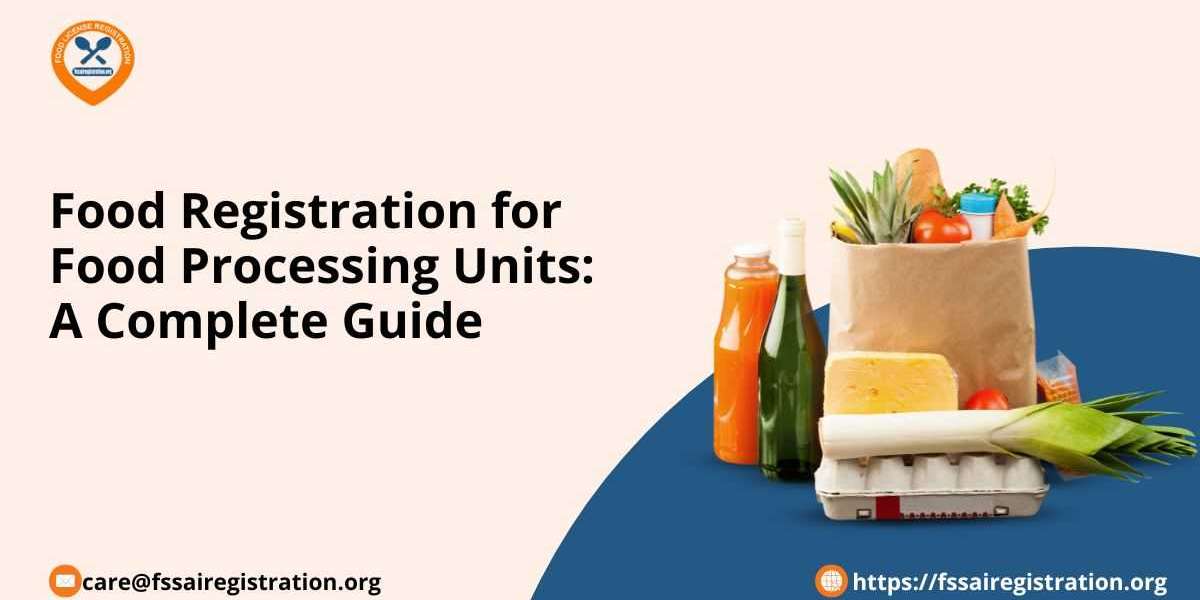Food processing units play a vital role in the food industry by converting raw ingredients into packaged or processed food products. However, to ensure food safety, quality, and hygiene, every food processing business must be legally registered under food regulations. In India, food registration is governed by the Food Safety and Standards Authority of India (FSSAI), which ensures that all food businesses comply with safety and hygiene standards.
If you own or plan to start a food processing unit, registering your business is essential for legality, credibility, and smooth operations. This guide explains why fssai license registration is important, the types of registration, the benefits, and the step-by-step process to apply for it.
What is Food Registration?
Food registration is the legal process of obtaining a license or certificate to operate a food business. It ensures that the business follows food safety laws, hygiene practices, and quality standards.
In India, the FSSAI registration or license is mandatory for all food processing units, including:
- Small-scale and large-scale food factories
- Packaged food manufacturers
- Dairy and meat processing plants
- Bakery and confectionery units
- Edible oil refining units
- Frozen food and ready-to-eat food producers
Once registered, the business receives an FSSAI registration number, which must be printed on all food packaging labels.
Why is Food Registration Important?
1. Ensures Legal Compliance
Running a food processing unit without FSSAI registration is illegal and can lead to fines, penalties, or shutdown orders. Registration ensures that the business operates legally under food safety laws.
2. Build Consumer Trust
Consumers prefer certified and registered food products. The FSSAI license number on packaging gives confidence to buyers about the quality and safety of the food.
3. Increases Business Credibility
Registered food businesses gain better market reputation and trust. It helps in:
- Selling to big retailers and supermarkets
- Expanding into export markets
- Getting partnerships with distributors and suppliers
4. Helps in Business Growth and Expansion
With a food license, businesses can:
- Enter new markets
- Expand production capacity
- Secure government tenders
5. Avoids Legal Penalties
Non-registered food businesses may face:
- Heavy fines from food authorities
- Legal action or cancellation of operations
- Damage to brand reputation
6. Mandatory for Export and Online Selling
Food businesses planning to:
- Sell on e-commerce platforms like Amazon, Flipkart, or Swiggy
- Export processed food to international markets
Must have a valid FSSAI registration or license.
Types of Food Registration for Food Processing Units
FSSAI provides three types of food registrations based on business size and turnover:
1. FSSAI Basic Registration
- For small food processing units with an annual turnover of up to Rs. 12 lakh.
- Suitable for home-based food businesses, small bakeries, and small packaged food manufacturers.
2. FSSAI State License
- For medium-sized food processing units with an annual turnover between Rs. 12 lakh to Rs. 20 crore.
- Required for mid-sized food manufacturers, meat processing plants, and food packaging factories.
3. FSSAI Central License
- For large-scale food processing industries with an annual turnover of above Rs. 20 crore.
- Mandatory for businesses involved in exporting food products or operating in multiple states.
Step-by-Step Guide to Register a Food Processing Unit
- Visit Website – Open the official FSSAI registration portal.
- Fill Application Form – Enter your name, business details, and food category, and upload your PAN card.
- Review Submit – Check all details and submit the form.
- Pay Fee – Complete the payment online as per your license type.
- Verify OTP – Enter the OTP sent to your registered mobile or email.
- Inspection (If Required) – Officials may inspect your premises for approval.
- Get an FSSAI License – Once approved, download your FSSAI license from the website.
How to Renew or Modify an FSSAI Registration?
Renewal Process
- The FSSAI license is valid for 1 to 5 years.
- Businesses must apply for renewal 30 days before expiry.
- The renewal process is similar to new registration.
Modification of License
If there are changes in business details (name, address, food category, or ownership), the license must be updated. This can be done online through the FSSAI portal.
Common Mistakes to Avoid During Registration
- Selecting the Wrong Registration Type – Choose the correct category based on turnover.
- Incomplete Documents – Ensure all required documents are uploaded.
- Incorrect Business Details – Verify business name, address, and product list before submission.
- Delaying License Renewal – Apply for renewal before the expiry date to avoid penalties.
- Ignoring Food Safety Rules – FSSAI may reject applications if safety compliance is not followed.
Note: Now easily tatkal fssai license through the fssai Registration.
Conclusion
Food registration is essential for food processing units to ensure safety, legal compliance, and business credibility. The FSSAI registration process is simple and can be completed online.
By obtaining a valid food license, businesses can expand operations, gain customer trust, and avoid legal penalties. If you own a food processing unit, complete your FSSAI registration today to operate smoothly and grow successfully in the food industry.








